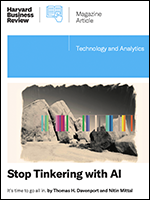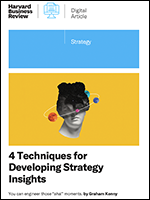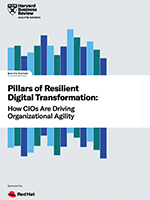Managing in the age of outrage

People are outraged! Whether it's climate change, COVID restrictions, taxes, or inflation, there will always be a current event that managers have to manage through. What’s the best way to lead in a polarized and uncertain world?
How to map out your digital transformation

Uncertainties around digitalization have bounced back after a huge boost during the pandemic.
Stop tinkering with AI

Feeling unsure about your AI initiatives? Many organizations are starting small and staying cautious. The component that will truly add economic value is deployment on a large scale.
4 techniques for developing strategy insights

Gathering insight is key to strategic success because it creates a competitive advantage. But first, you must determine what strategic factors are most relevant to your organization’s key stakeholders.
ChatGPT and how AI disrupts industries

ChatGPT has shown us the power of generative AI to take on tasks traditionally associated with “knowledge work.” But we won’t solely rely on machines in the future; we’ll always need the human touch.
Pillars of resilient digital transformation

With a number of new challenges on the horizon this year – from economic concerns to supply issues to heightened customer and employee expectations – CIOs are being called upon to build greater resilience and agility into their organization’s DNA.
How to explain modern software development in plain English

Modern software development is more deeply connected to business value today than ever. Pick your axiom – software is eating the world, every business is a software business, etc.
Managed services vs. hosted services vs. cloud services: What's the difference?

IT leaders need to evaluate - and explain - today's array of options, including managed services and hosted services. Download this primer for guidance.
Kubernetes: Everything you need to know

Download our handy PDF primer on Kubernetes for IT leaders and CIOs. In this white paper, learn key terms, trends, and use cases for this essential technology.
Ebook: 10 resources to make you a better communicator

Effective communication is critical throughout all aspects of IT leadership. Whether you are seeking to improve your one-on-one conversations or clarify broad organizational messaging, this Ebook has the expert advice you need to achieve your communication goals.


